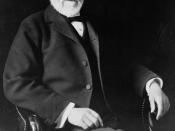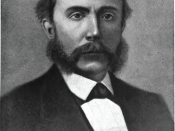The American Businessman: Industrial Innovator or Robber Baron?
During the latter part of the nineteenth century, industries began to bloom across the United States. Local businesses and merchants gave way to larger corporations and industries. The head of these industries, such as the names of Rockefeller, Carnegie, and J.P. Morgan, were looked upon as robber barons by some, industrial innovators by others. A baron is "one having great wealth, power, and influence in a specified sphere of activity: an oil baron." Therefore the robber barons that these men were looked upon as were "one of the American industrial or financial magnates of the late 19th century who became wealthy by unethical means, such as questionable stock-market operations and exploitation of labor" (Dictionary.com). Other people saw these highly intelligent men as industrial innovators, people, who "begin or introduce (something new) for or as if for the first time" in order to further develop the efficiency of the industries (Dictionary.com).
Although the ways that these men acquired fame and wealth were immoral ways and ways of corruption, these men were industrial innovators who without them, this country would not be where it is today.
There were many reasons for why the public believed that these men, like Carnegie and Rockefeller, where corrupt robber barons. They believed that these men were in the business for the sole purpose of making money, and cared very little if not at all about the technological advances of the industry and the nation as a whole. Walt Whitman, a famous person of the time felt that "the official services of America, national state, and municipal, in all their branches and departments, except judiciary, are saturated in corruption, bribery, falsehood, mal-administration; and the judiciary is tainted...In business...the one sole object is, by any means, pecuniary gain...[M]oney-making is...



The American Businessman
I'm appreciative of your well researched essay in which you address the question as to whether the American businessman of the latter part of the nineteenth century can best be described as industrial innovator or robber baron. Men like Andrew Carnegie and John D. Rockefeller were unquestionably fierce competitors in the business world and made many enemies. However, you are right in pointing out that they also made valuable contributions to our economy and thus the question as to whether they were industrial innovators or robber barons cannot be definitively answered. Perhaps they were a little of both. At any rate, your report was engrossing and well written. Your internal citations could have been made more valuable with the addition of a bibliography. Good work!
7 out of 7 people found this comment useful.